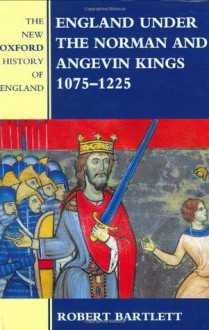
Robert Bartlett’s contribution to the New Oxford History of England series is about a kingdom in transition. In 1075, England was a newly conquered realm of William of Normandy, who was transforming the sleepy monarchy of the Anglo-Saxons into a powerful feudal state. A century and a half later, his great-great-great grandson, Henry III, issued a modified Magna Charta that served as the foundation of English common law, establishing the right of the English aristocracy against the king. How this evolution took place forms just one aspect of this exceptional book, which addresses nearly every aspect of England’s politics, culture, and society during this period.
In doing this, Bartlett adopts an analytical rather than narrative approach. Events are studied within the context of the broader patterns and developments of the era. This makes for a more challenging read but also a much more rewarding one, with insights contained on every page. Readers unfamiliar with the period should start with a survey such as David Carpenter’s The Struggle for Mastery, but even knowledgeable students of the period will learn much from Bartlett’s clear writing and perceptive analysis.

 Log in with Facebook
Log in with Facebook 






